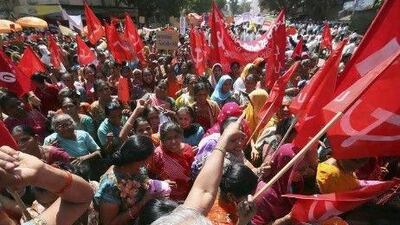NEW DELHI // A nationwide strike in India - billed as one of the largest in the country's history by the 11 trade unions that took part - hit the banking, transport other key sectors yesterday but remained largely peaceful.
Markets in New Delhi remained open and privately run buses packed the streets, but many of the city's ubiquitous taxis and auto rickshaws remained off the roads.
Stranded travellers negotiated fares with private taxis at Nizamuddin, one of Delhi's railway stations.
"I was prepared for this," said Nirmala Sharma, 47, who arrived from Lucknow to spend a week with her sister's family in Delhi. "I have to pay a little extra but at least there is something to get me there."
In South Extension, a neighbourhood in South Delhi, a row of 10 driverless rickshaws drew complaints from commuters. "This is an inconvenience," said Pratap Singh, 21, who usually takes an auto rickshaw twice a week to a tutoring session. He waited at a bus stop. "I was hoping the auto drivers would not strike."
Parts of the country with a strong communist presence were the worst affected by yesterday's 24-hour stoppage.
Rallies in Kolkata drew large crowds, with more than a hundred protesters arrested for obstructing rail and road traffic.
But chief minister Mamata Banerjee, of the All India Trinamul Congress party, who came to power last May after more than 30 years of Communist rule in West Bengal, was adamant that the strike had failed.
She had threatened punitive action against striking government workers and toured government offices to check on attendance yesterday. Many workers chose to stay in their offices overnight on Monday to avoid pickets.
"Strikes hamper the growth of West Bengal," said Ms Banerjee, who led many strikes during her years in opposition. "There is no strike at all. Everything is open. All the buses, trains, taxis are running.
"The flights have also operated totally according to schedule. The presence of government employees in the offices has been near about 100 per cent."
Across the country, many shops and banks were closed, with even employees of the Reserve Bank of India choosing to join the strike.
Early reports pegged the number of participants at about 800,000 - less than the millions envisaged by organisers.
It was the first time that all 11 of the central trade unions had united for a strike, including those affiliated with the ruling Congress party.
They were joined by nearly 5,000 other smaller workers' unions, according to Gurudas Dasgupta, the leader of the All India Trade Union Congress.
"This is a historic occasion. For the first time, all the big trade unions have come together to protest the anti-labour polices of the government," he told Agence France-Presse.
The unions are demanding an end to contract labour, an amendment of the Minimum Wages Act, an increase in gratuity payout and compulsory registration of trade unions within 45 days.
The strike comes after a difficult year for the economy, with growth forecasts slipping from 9 per cent to 7 per cent and the government struggling to keep inflation out of double figures.
The unions say they will consider further action if the government does not respond to their demands, although this has been met with scepticism within the business community.
"The problem with a strike on such general issues is that none of these things can be solved overnight, or even in the next year," said BP Pant, the director of labour and employment at the Federation of Indian Chambers of Commerce and Industry.
"The unions perhaps feel a need to flex their muscles at a time when union power has been falling across the globe."
The strikes are another headache for the government of the prime minister, Manmohan Singh, which has bounced from one corruption scandal to another since returning to power in 2009, while failing to pass a single significant economic reform.
Follow
The National
on
Surya Bhattacharya on
& Eric Randolph on

